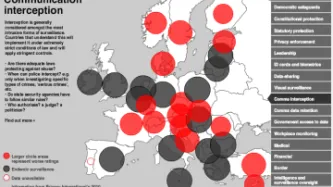Search
Content type: News & Analysis
Today we launch the public consultation process for the International Principles on Communications Surveillance and Human Rights. From now until January 3rd, we are inviting comments and suggestions on the draft principles.
The rationale behind these principles is to provide civil society, industry and government with a framework against which to evaluate whether current or proposed surveillance laws and practices are consistent with human rights. Now more than ever, we need greater…
Content type: News & Analysis
Communications surveillance is one of the most significant threats to personal privacy posed by the state. This is why many statements of fundamental rights across the world give special regard to the privacy of communications. For example, the Universal Declaration of Human Rights states in Article 12:
No one should be subjected to arbitrary interference with his privacy, family, home or correspondence, nor to attacks on his honour or reputation. Everyone has the right to the protection of…
Content type: News & Analysis
Governments have no automatic right of access to our communications. This will sound highly controversial to some, even downright radical. But the demands of national security and crime prevention do not, in fact, immediately trump every other right and responsibility in the complex relationship between citizen and state.
The recent Skype argument is a great example. Skype has always prided itself on being a secure method of communication. Businesses, government agencies, human…
Content type: Press release
The government today published a draft version of a bill that, if signed into law in its current form, would force Internet Service Providers (ISPs) and mobile phone network providers in Britain to install 'black boxes' in order to collect and store information on everyone's internet and phone activity, and give the police the ability to self-authorise access to this information. However, the Home Office failed to explain whether or not companies like Facebook, Google and Twitter will be…
Content type: Press release
An internal Liberal Democrat briefing on Home Office plans to massively expand government surveillance was today passed to Privacy International. The document contains significant evasions and distortions about the proposed 'Communications Capabilities Development Programme' (CCDP), and is clearly intended to persuade unconvinced Lib Dem MPs to vote in favour of the proposal.
The document contains a section entitled 'Remember, under Labour' consisting of a list of the previous government's…


